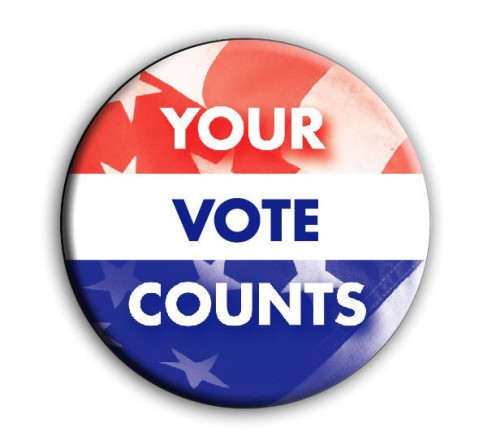How do you discipline children?



Effective discipline techniques
Well, the bad news is that this is at least as much about you as the parent as about the child. Your responses to and understanding of childhood misbehaviors will likely determine your response style, as will your own upbringing. Most of us have had times where we've used just that turn of phase which we hated our mother's using on our own children. Did I just hear "I I've told you once, I've told you a million times, ....because I said so, .....don't do as I do, do as I say" come out of my mouth?!
You can't escape your upbringing, most of us parent in the style of, or in reaction to our own parenting, and really, neither reaction is necessarily good, unless you had really great parents. So, your first step is becoming aware of your own ideas about parenting, discipline, how much control you have or feel you should have over your child's actions and reactions. So, if you had good parents, great, you'll probably just need a tweak here or there - even those with "perfect" parents are likely to have parenting issues from time to time. If your own upbringing wasn't great, then you need to teach yourself the positive skills that weren't modelled for you, its not enough just to try not to repeat your parent's mistakes.
Ever have one of those days?!
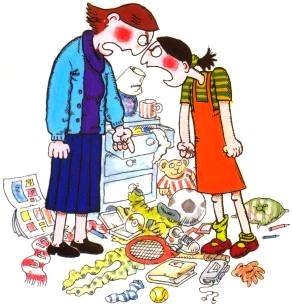


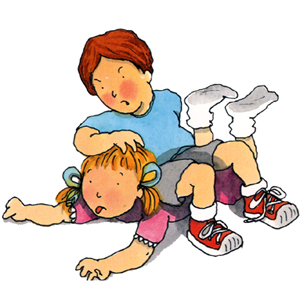


Helpful hubs
- Discipline And Parenting Techniques For Young Children
Differentiates parenting styles and resultant child behaviors - Developing a behavior management system for kids
Here are some basic principles for behavior management that can work with a range of disciplinary and behavioral issues - Tips for dealing with difficult behavior in children
- Child Discipline: Positive Parenting & Positive Discipline
A positive parenting solution to raising children who behave themselves without spanking or correction. Positive parenting techniques are presented along with examples of positive discipline. - Parenting Help - How to Use Child Discipline
Are you a parent needing help learning how to discipline your child? At some time or another we all need tips on parenting and child discipline is the topic of discussion here...
Life lessons
Parents, at times can become so fearful about preventing bad things from happening to their children, that they stifle them, they become so afraid of damaging their children, that they damage them. These well meaning, conscientious and child focused parents become so consumed with preventing danger from befalling their child, that not only they, but the child loses out on the rough and tumble, the "look ma, no hands" and the times they skinned their knee, but caught a frog and learned a life lesson about perseverance and patience which will stay with them beyond their next lesson, which may be "when we forgot about Mr Frog & don't feed him......"


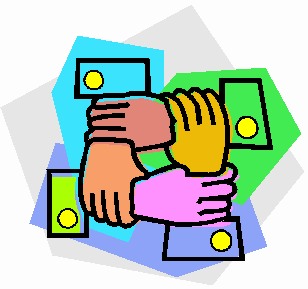






- Why kids misbehave
A look at some of the common underlying reasons for misbehavior and ways to intervene. - Classroom Behavior Management Strategies by Dr Mac
Dr. Macs Amazing Behavior Management Advice Site - Raising Happiness | Greater Good
Information about positive psychology and parenting - Parenting.org | Valuable resources, articles and stories offering parenting help in today's world.
Free resources, articles and stories from the experts at Boys Town. Ask parenting questions online and search by age or topic. - Assessing Young Children's Social Competence. ERIC Digest.
Provides descriptions of childhood social competencies and a checklist to see if your child is on target
How do I get some of the good stuff?
1. Be Consistent
No other way around it - don't say it if you don't mean it and follow through - every time, even when it'd be easier to ignore the behavior, even if it leads to a confrontation, even if you have to hear "I hate you" or "you're not my friend anymore" - that's okay, you're the parent and knowing that they have a parent who is structured and consistent helps kids feel safe and that they will be treated fairly, which brings us to our next point.
2. Be Fair
Kids don't have to agree with the rules, but they do need to know that whatever the rules are you will enforce them evenly and consistently. Fairness is very important to childhood and gives you a chance to show them how to deal with others (remember, these are the behaviors that will be used to parent your grandchildren)
3. Stick to your decisions and follow through
Don't say it unless you can enforce it, and don't set consequences when you're angry.......remember when you want to ground your child for the rest of their life - that means you're stuck too - and with a miserable kid, there are better consequences which definitely make more of an impact on a kid.
4. Know thyself
Being aware of your parenting style, what you react and overreact to, what is difficult for you to deal with, which behaviors make you see red? These are all things you should be asking yourself, so that you have a good grasp on your own issues. Spanking usually arises from parent frustration and/or lack of skills/alternate models and is a mixed message at the very least to send to a child.
5. Know thine enemy
You know your child better than anyone, so....what would they do? How do they understand things? What calms them down? What amps them up? What scares them? What makes them laugh? What is unique about that child? When you make an effort to really understand your child and view the world through their eyes, you not only figure out a good many of those secret hiding places, but you validate for your child that what they see, hear and understand is important enough for you to try and understand it
6. Pre-plan your crisis
Think about the last tantrum - break it down, what happened before, after - would it have happened if there had been someone else there? How did you handle it. Make a note to self of what worked and what didn't - and if you could do it again (because we do love to replay scenes until we get just that perfect comeback), what would you do differently.
Note potential crises and hotspots - everyone is grumpy when they are too cold/hot, tired, ill or emotionally overwrought so make sure you think of things like snacks if your child (or you) gets crabby. Transition times: bath times, bed times, homework are all high risk points. Try to anticipate difficulties and build in solutions - be flexible and give yourself some time for you.
7. Dress rehersal
Well, what are best friends for? Test drive your plan with a friend, this way you hone what you want to say, feel more confident about the limits and consequences and are less anxious in general. Role playing is an excellent medium, not only for parenting practice, but to get a real sense of how you come across to your child.
8. Devil's advocate
Try and trip yourself up. Most kids, especially teenagers, dedicate at least some part of their life to trying to foil, wiggle out of, out maneuver, outsmart or just outrun their parent's consequences - and they generally have more time and energy than either you or I to invest in this. So, challenge yourself to find a loophole in your contracts, an edge, a word..."but you didn't say that."
9. Through a child's eye's
Ok, now go back over your behavioral plan and try to see it as you would from your child's perspective - they don't have to agree with it, but you need to see that it's realistic, fair and achievable within a relatively short time span or you will both lose motivation. It's also good to do a final check to edit out all those "you're grounded until you're 37" statements that may have slipped in. Remember when 2 weeks was an impossibly long period?
10. Save yourself
If all else fails and you really feel as though you're going to lose it......retreat, take a step away from the action. Take a self time out to give yourself some perspective.
You are not rational when you are angry so you're wasting your time trying to process. People who try to process emotional events when angry often either end up in a spiral where they ruminate about how they've been wronged and plot revenge (which is far more time than you have available as a parent, so scratch that technique) justifying themselves and feeling righteous, indignant and victimized or are completely unable to access the logical part of their brain and explode, tantrum and generally show everyone around them that they are about 2 - (and we've all been there).
The point is, that both these techniques waste valuable time and resources - they're ineffective, they don't work. Waiting until you've cooled down is hugely more productive and focused, if you need an excuse, head to the nearest bathroom......self time outs are highly underrated!
"The greatest gift one person can give to another is attention." That Nicht Hahn

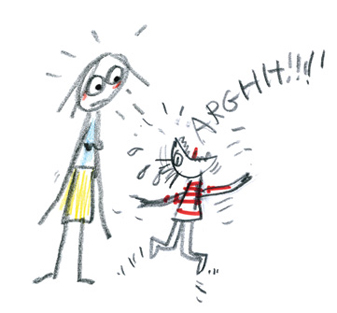




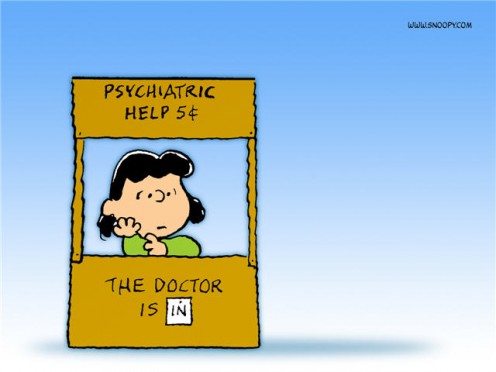
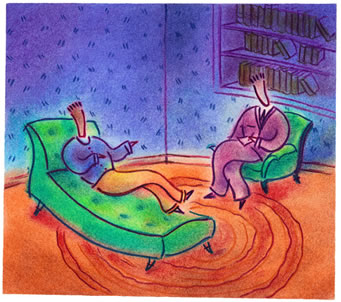
When do I need a professional ?
While most family tiffs and discipline problems are transitory, there are times when an increase in kid's behaviors such as moodiness, irritability, disrespect, withdrawal and isolation may signal something more serious. Many of the behaviors associated with mental illness are also common in adolescence, and at other times throughout life. We all go through times when we are moody, sad, mean, self conscious and self centered, spiteful, vindictive and cruel - (hopefully not all at once, and definitely not for weeks and months at a time!). When this becomes a pattern of anybody's life, child or adult, there is a problem that deserves consultation.
For most people, the first place is their friends and or family members - and that's an important support system, but if you find yourself talking to strangers at the gym or in line at the grocery store, it's probably time. Your family practitioner can often be helpful, but if you've determined this is a mental health/behavioral/relationship problem - ask for a referral to a mental health specialist and get directly to the heart of the issues.
Barring immediate danger and threat to life and limb, another good indication is - "outside agency involvement." Generally speaking, if things have got to beyond the "oh, boy your mom and dad are going to be pissed!" stage - you need a consultation, you've hit the critical level and you need support and safety to make the best possible decisions for yourself and your family - and the space provided by counseling, when participants are motivated, can help facilitate great changes. In each crisis, there is the possibility or growth.
If you feel that your child's behavior is grossly and dangerously out of control, consider having an evaluation immediately, each county (at least in California), has a psychiatric evaluation service available 24-7. If you feel there is an imminent danger - call 911 or your local police department.
When you feel you can't cope - don't judge, and don't force yourself,
-often our biggest strength lies in our ability to know our weaknesses.
If you are lost in the woods with a broken ankle - is it brave or stupid to deny that you are injured and continue to walk on the ankle?- we see it with physical issues, but it's the same mentally, remember, always put your airplane mask on first in a crisis - you are your most important resource - and perhaps more importantly, the only one with direct access to controlling yourself.
Another myth that haunts many of us is that we have been brought up to believe "no pain, no gain", but let me save you some time and pain here, - it's not true, not in sports, not in psychology, not in medicine, not in relationships and not in life.
So basically, when should you seek professional intervention? well, think about the suggestions, but go with your gut, trust your judgment, put yourself aside and try to look at what you've tried and how much this is affecting your and your family's lives, if you think you need help - go!
- as a caveat, however, it doesn't work the other way - just because you don't think you need therapy doesn't always mean you don't - don't you wish it were that easy ;)



Have your say
Was this hub helpful to you?
